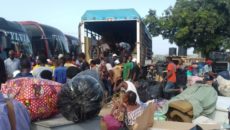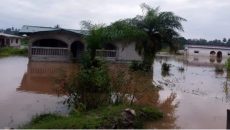BUDUBURRAM CAMP, Ghana—The Liberian government has begun repatriating 4,323 Liberians from the former Buduburam Refugee Camp in Ghana.
The exercise was prompted by the demolition of the camp on February 27 by Ghanan authorities, leaving the thousands of Liberians there homeless. Many had sought shelter in schools, churches, and other public buildings.
The Liberian government provided 15 chartered buses to repatriate 770 citizens to Monrovia in the first phase of the emergency exercise.
Janet Mulbah, one of the returnees speaking to The Bush Chicken in an interview, described the demolition as a complete disaster, as she and thousands of other Liberians were made homeless.
“The situation has been very bad – people’s homes were broken down [and] they lost their properties,” Mulbah said.
“There is nowhere like home – we are tired of Ghanaians telling us, after every little thing, to go back to our country, as if they are not in our country, too.”
Finally home after 26 years away, she thanked the Liberian government for the repatriation program.
Another returnee, Wilmot Dweh, also expressed disappointment over the demolition of their home, calling the experience “painful.”
“I can’t say I am happy with life – we came here for refuge, and we have been here for a very long time since 1997,” Dweh said.
Trokon Zondo, another stranded Liberian, also praised the government for the rapid response.
“One of the things I appreciate is that the government just came to power like a month and the demolition started, and in the shortest period, the government is here to repatriate her people,” Zondo said.
Sarah Pearson, a pastor of the Church of God in the Buduburam Camp, said the reason for the camp’s demolition remains unknown.
Pearson said she does not remember any incident by Liberians that precipitated the action of the Ghanian authorities.
“I can’t record what really went wrong – we were told that they were only breaking down Area A for the construction of a market and [they would] relocate those in Area A. Later, they started breaking down all of the houses belonging to Liberians from Areas A, O, and T – it got us confused,” she explained.
“When the Caterpillar [machine] hits your house, they will tell you not to take anything – my church was broken down. In fact, people were seeking shelter in my church. We appealed, but the operator refused and broke it down. Some people did not take anything. Some are now sleeping under the trees in the streets. Thank God our government is here to take us home.”
She encouraged her fellow Liberians residing in the camp and nearby areas to return home.
The head of the Elders Council of Liberians in Ghana, Eliot T. Nimely, also expressed frustration over the treatment by the Ghanaian authorities for breaking down homes belonging to Liberians.
Nimely said it was frustrating for citizens of an ECOWAS country to receive such treatment in another ECOWAS country. “I’m very discouraged, but we leave it with God,” he said.
“I have been here for 34 years. As you can see, we are not in our houses – they were all broken down. My wife, my children, and other Liberians, including myself, sleep in this church,” he said.
Franklin Tolbert, another Liberian returning home, explained that life for him and his family has been challenging as refugees.
“Life here is very complex; it is not conducive for us. Some of us have no one abroad to help. We have spent all our lives here, and going back home is like a strange place,” Tolbert told The Bush Chicken.
He wondered what package the government plans to give them upon their return to restart life. He feared that some returnees would burden the government with their needs.
“For the past 34 years, we have been here. We have no connection back home. Some of our children are taking drugs, some are not going to school, and some are in the streets,” he said.
“Some of them, their family members died, and when they go back home, they think about it. It reminds them about the death of their families. They feel bad, and sometimes staying away is the best.”
Another resident of the demolished camp, Princess Sengblen, called on the Liberian authorities to pay special attention to Liberians in Ghana who have mental illnesses, those in jail, and those with disabilities.
“I want the government to do something for them – they are also citizens of Liberia, and they deserve to be supported, or else trauma will kill them,” Sengblen said.
A high-powered government delegation, led by Deputy Foreign Minister for Legal Affairs Jeddi Arma, traveled to Ghana over the weekend to kick off the citizens’ repatriation.
Armah urged Liberians in the camp to return home and contribute to Liberia’s rebuilding, noting that they would no longer be refugees but would live in dignity.
“Living perpetually as a refugee impedes the pace of individual growth and development as well as deprives one of equal opportunities in a competitive space,” he said.
He said the refugee camp was established as part of interventions to save Liberians who fled the civil wars; as such, there is a need to return home as the country currently enjoys uninterrupted peace.
He thanked the Ghanaian government, the UNHCR, the Ghanaian Refugee Board, and the Chiefs of the Gomoa Fetteh Region, which hosts the camp, for the support and hospitality shown to Liberians over the years.
The deputy executive director for operations of the Liberia Refugees Repatriation and Resettlement Commission, Richard Hoff, assured Liberian returnees that the government was fully prepared to repatriate them. He said the CARI Regional Transit Village in Gbarnga, Bong, had been renovated to accommodate them.
He said the United Nations has also agreed to conduct a rapid assessment of the former refugees’ needs, and 100 communities have also been identified in Liberia for their stay before reintegration.
The president of the Liberian Association in Buduburam Camp, Dennis Gwion, thanked President Joseph Boakai for the repatriation. He urged the Liberian community to take advantage of the opportunity to return home and contribute to the growth and development of their country.
The Buduburam Camp, about 44 kilometers outside Ghana’s capital, was established in 1990 by UNHCR to host refugees fleeing the civil wars in Liberia between 1989 and 2003.
On February 27 this year, a section mainly occupied by former Liberian refugees and migrants was demolished on the order of the Gomoa Fetteh Traditional Council, the owner of the land, leaving Liberians there homeless.
Featured photo by Sampson David



